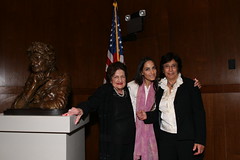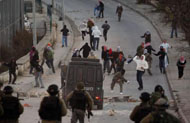
:: Click to view FULL FESTIVAL SCHEDULE
 1 Oct 2010 5:57 PM By Omar Baddar
1 Oct 2010 5:57 PM By Omar Baddar
The
Boston Palestine Film Festival (BPFF) will kick off its 4
th annual series this Friday, October 1
st, with an opening reception and film at the
Museum of Fine Arts. On the face of it, it may seem like just another cool series to attend this fall (and that much it certainly is), but the journey that led the Boston Palestine Film Festival to where it is today is one of the most inspiring testaments to the extraordinary power of only a few committed activists to bring people together every year.
In October 2007, a local restaurant in Cambridge, Massachusetts witnessed the jubilant closing reception of the first Boston Palestine Film Festival, propounding a moment of reflection on the incredible success of what had long been an ambitious vision brewing in the minds of a few activists. It was the emergence of Tawassul, an organization dedicated to promoting Palestinian arts and culture, coupled with the enthusiasm of a former film curator at the Museum of Fine Arts for the idea that finally brought the Boston Palestine Film Festival to fruition.
The Festival is remarkably popular in Boston, with thousands attending it each year. Salma Abu Ayyash, a lead organizer who has been with the project from the beginning, notes that attendance had grown by 17% in 2008, and by a stellar 42% in 2009. "The comments we get from people are very encouraging," said Ayyash. She added:
We spend roughly the whole year preparing for the festival with varying intensities depending on how close we are to the actual festival time. It's a labor of love and we are often burned out and frustrated. But during the festival, the way it's received and the comments we get from people-that's what keeps us going year after year.
Susan Barney, a local activist, had this to say about the Festival:
It really is, quite honestly, the highlight of the year in so many ways. It brings the community together in a very different way than all our other work; it really makes a difference to have the festival. It gives us something to look forward to and focus on, something that is uplifting and positive--even though the content of so many of the films reflects the painful and tragic reality for Palestinians.
The unmistakable streaks of the Boston Palestine Film Festival's logo become ubiquitous in the lead up to the Festival, appearing on wall advertisements in the T (the Boston subway system); on brochures, posters, and flyers; in local transit and school newspapers, and online. The Festival also gets reviewed in the city's leading paper, the Boston Globe.
Kate Rouhana, one of the Festival's organizers, said that it was a "critical objective of BPFF to empower and inspire Palestinians to tell their own stories through the medium of cinema." Citing the scarcity of markets as a major inhibiting factor that keeps aspiring Palestinian artists from gaining visibility and experience, Rouhana said:
In our own small local way, by providing one such forum and modeling for other Palestine Film Festivals to follow, we hope to nurture and inspire a new generation of artists who can bring Palestine and its people vividly alive in the consciousness of the world.
Over the past few years, BPFF has slowly grown beyond films to include a wide range of artistic performances. This year's festival includes the Boston debut of the stand up comedy show Arabs Gone Wild, a live musical performance by Le Trio Joubran, a panel discussion on the future of Palestinian cinema, and a wide range of films and documentaries, many including a Q&A session with their directors (click here for this year's full schedule).
Zooming out a little from Boston, this film festival has served as a catalyst for a broader momentum that is worth highlighting. Katherine Hanna, another organizer with the Boston Palestine Film Festival, notes that there were only two other Palestine film festivals, in Chicago and London, before Boston harnessed the energy to put its first festival together in 2007. Today, there are annual Palestine Film Festivals in Houston, Toronto, and Ann Arbor; and an aspiring Palestine Film Festival in Fayetteville, AR. The organizers also coordinate and share information with a Human Rights film festival with a Palestine focus in New Orleans, as well as the Arab film festivals in San Francisco and Sydney. Hanna has also been in touch with individuals in San Diego and Brussels, working on the prospects of starting Palestine Film Festivals in their cities in the near future. The energy is contagious and it is catching on in different parts of the world.
Salma Abu Ayyash is hopeful that the growing popularity of the Festival will raise awareness about the injustice under which Palestinians live today and play a constructive role in resolving their grievances:
The more people attend the festival the closer we are to achieving our goal of presenting the Palestinian narrative in a way that will hopefully shift people's notions towards a better understanding of the Palestinian struggle and bring us closer to bringing true peace to the region.
As the slogan goes, "vision is the ability to see what is possible before it becomes obvious." A few years ago, a handful of activists in Boston had a vision of what was possible. This weekend, their creativity, dedication, and hard work will once again be attested to by thousands of people will attend the Boston Palestine Film Festival. Their efforts should remind the politically active and artistically-oriented throughout the country of what Margaret Mead would certainly want to remind them of: to never underestimate the power of a few committed people to do remarkable things.

:: Friday Oct 8, 2010 ::
"... this year's must-see documentary ..."
The New York Times
BUDRUS
co-presented with Amnesty International USA -Northeast Regional Office

with Mahassen Nasser-Eldine


 :: Sunday Oct 10, 2010 ::
:: Sunday Oct 10, 2010 ::
Closing Night Film
PORT OF MEMORY
with director Kamal AlJafari
 Mira Awad at her home in Tel Aviv. Photograph: GALI TIBBON
Mira Awad at her home in Tel Aviv. Photograph: GALI TIBBON
































